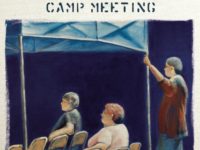Jazz fans tend to have a love/hate relationship with pop music covers. On the one hand, there are examples like Coltrane’s “My Favorite Things” that are sort of hard to argue with. Face it, reinterpretations like that not only put a new spin on an old favorite, but kick open the door of perception to reveal the structural tendrils that are hidden to many a listener.
That…and it just sounded cool as hell.
For me, the hate part of this never made any sense. Maybe that’s because I’ve never subscribed to the supposed “purity” of jazz thing. You know…the idea that since jazz was constructed on hallowed grounds, it must not be exposed to any outside (read: popular) forces? The idea that jazz must remain in the museum? I’m sorry, but jazz is not dead. At least, not to my ears.
Which is why I can appreciate the efforts of groups like Jazz Folk. Bass, drums, piano (Peter Scherr, Simon Barker, Matt McMahon) and a bunch of pop and rock tunes only a true music nerd can appreciate. I mean, look at the artist lineup: Taj Majal, The Velvet Underground, Lou Reed, Joni Mitchell, the Grateful Dead, Beck. Trust me, this is not just a collection of jazzified pop songs.
The songs? “Corinna,” (Taj Mahal), “Pale Blue Eyes”/”All Tomorrow’s Parties” (Lou Reed), “To Lay Me Down” (Hunter/Garcia), “That Song About the Midway” (Joni Mitchell), and three from Beck’s Mutations album: “Nobody’s Fault But Mine,” “Tropicalian Shadows,” “Cold Brains.” Thinking about these tunes in their original form vs. their Jazz Folkifications, it strikes me that the group managed to hilight the essence of each selection while tying together certain commonalities, giving the collection a great sense of cohesiveness.
Examples? There’s a certain feeling of beatific elegance and majesty that runs through “To Lay Me Down,” “That Song About the Midway,” and “Nobody’s Fault But Mine.” Then we have the rootsiness and drive of “Tropicalian Shadows” and “Corinna” (I totally dig the electric piano on the latter). The pair of songs certainly come from different genres but somehow hang together here.
My two favorite tracks on Jazz In The Stone Age arrive toward the end of the program and illustrate the range of approaches taken. For “All Tomorrow’s Parties,” the emotional arc of the original song is mostly followed, with increasingly chaotic piano taking the place of the Velvet Underground squall. Beck’s “Cold Brains,” on the other hand, is turned into a trip-hoppy raveup that will make you reach for the volume. Even with these disparate takes on the pair of songs, they still feel like they’re of a piece.
I’d like to think that Jazz In The Stone Age will have as much of an impact on new listeners as did Trane’s groundbreaking record, but that’s unlikely. Still, if it can draw a few more listeners into the world of jazz, that’s good enough for me. Intent and results aside, this is still a fine bunch of covers.
- Why the Rolling Stones’ Harrowing ‘Gimme Shelter’ is Still Revealing New Depths - November 18, 2024
- How Talking Heads’ ‘Fear of Music’ Opened Up a World of Art and Sound - August 5, 2024
- How Deep Cuts Propelled Bruce Springsteen’s ‘Born in the U.S.A.’ - June 4, 2024



